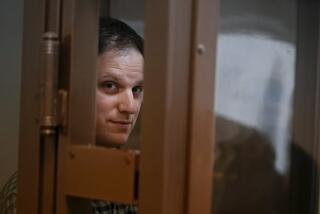U.S. and Soviet Closed Areas on Agenda : Summit May Ease Press Travel Curbs
- Share via
WASHINGTON — Soviet news correspondents may get to visit Disney World in Florida, and their U.S. counterparts may get to tour the Siberian port city of Vladivostok, if longstanding travel restrictions are relaxed at the summit meeting in Moscow.
Easing of travel restrictions on the press in both countries is one of the points that will be on the table in talks starting Saturday between Charles Z. Wick, director of the U.S. Information Agency, and Soviet officials.
U.S. officials are hopeful that under Soviet leader Mikhail S. Gorbachev’s policy of glasnost , or openness, Soviet officials will consider lifting some restrictions permanently and letting correspondents visit areas of the Soviet Union that have been off limits.
Foreign reporters have been prohibited from traveling in much of the Soviet Union since 1937. In 1956, the United States followed suit and closed many areas of this country to the Soviet press.
Both governments require the other nation’s reporters to make all travel arrangements through government tourist services.
Wick said in an interview that he is hoping for progress in negotiations on these restrictions and on a number of other issues relating to information policy.
He said he will press Soviet officials to halt a disinformation campaign in which the official government news media have circulated false reports about U.S. government activities.
Wick said he complained last month about charges that appeared in Soviet newspapers that American scientists had developed the virus for AIDS, the acquired immune deficiency syndrome, and caused it to spread.
He said that although Gorbachev promised last December at the Washington summit meeting that disinformation would cease, “new stories have cropped up recently about the alleged U.S. preparation of biological weapons and the use of fetuses obtained in Central America for medical research here.”
He also said he will ask the Soviets to stop jamming Voice of America broadcasts. The only jamming now in effect, he noted, is against VOA broadcasts in the languages of Afghanistan.
“With the Soviets withdrawing (their troops) from Afghanistan,” he said, “it will be interesting to see if that stops.”
Other points he will pursue, Wick said, include increased distribution of U.S. publications, television programs and films in the Soviet Union and the establishment of a U.S. cultural center in Moscow.
More to Read
Sign up for Essential California
The most important California stories and recommendations in your inbox every morning.
You may occasionally receive promotional content from the Los Angeles Times.













